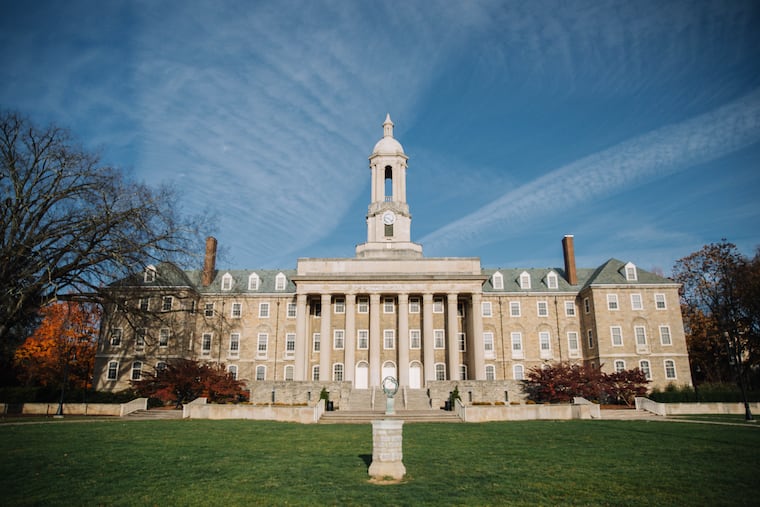Penn State’s budget proposal shifted after private meeting of trustees, university leadership
The closed-door meeting in 2022 is the latest in a pattern of potential Sunshine Act violations by Penn State trustees.

This story first appeared in The Investigator, a weekly newsletter by Spotlight PA featuring the best investigative and accountability journalism from across Pennsylvania. Sign up for free here.
In a February memo to university leaders, Penn State President Neeli Bendapudi wrote that last year university leaders “brought forward a $245 million deficit budget, which the Board of Trustees would not support.”
Yet, a review of agendas and meeting minutes for the full board and its finance committee reveals no record of the board receiving a budget proposal with a $245 million deficit. Bendapudi began as the university’s president in May 2022.
In a statement to Spotlight PA, Penn State wrote: “In spring 2022, university leadership talked with board leadership and shared their progress on the budget that would be presented at the July 2022 board meeting. During those conversations, board leadership suggested that such a large deficit would likely not be supported by the board if presented to them or taken for a vote.”
Months later, the board adopted an operating budget with a $149 million deficit in the university’s general fund.
Pennsylvania’s open meetings law requires that public agencies, including the boards of state-related universities, only deliberate and take official actions in meetings open to the public. Penn State’s trustees have previously faced questions about their interpretation of an exception to the law, specifically that the board’s executive committee held regular private meetings for more than a decade to plan and review agendas.
Penn State’s trustees may have violated the Sunshine Act if a majority of the voting members of the full board or a similar majority of committee members were present for the spring 2022 conversation, said Melissa Melewsky, media law counsel for the Pennsylvania NewsMedia Association, of which Spotlight PA is a member.
If a quorum was not present, Melewsky said, a conversation between trustees and university leadership could still run afoul of the spirit of the Sunshine Act, specifically the public’s right to see an agency deliberate its business.
“The vast majority of agency business, like a discussion of a budget, should happen in a public meeting,” she told Spotlight PA.
Shannon Harvey, board secretary and director of the Office of the Board of Trustees, defended the board’s actions in an email to Spotlight PA. (Read the full exchange with Penn State here.)
“The Sunshine Law does not restrict discussions between board leadership, board committee leadership and the university administration,” Harvey wrote. “The board does not take any official action outside of pre-arranged public board meetings at which a quorum is present. We believe that our conferences, executive sessions and public meetings are structured to comply with the law.”
Penn State’s budget deficit — within Penn State’s roughly $3 billion general funds budget and which Bendapudi has characterized as “structural” — led to cuts across the university, an ongoing “strategic hiring freeze,” and likely layoffs.
The reported size of Penn State’s deficit has shifted over time. In 2021, the Board of Trustees adopted a budget with an expected $166.4 million deficit in its general fund for fiscal year 2022. In July 2022, just days after the close of the fiscal year, the university projected its general funds deficit to be $191 million, a figure that was cited in news coverage of the university’s hiring freeze.
In September, the administration projected a deficit of $127.4 million. Yet, in a December filing to the Pennsylvania Department of Education of its actual income and expenditures for the previous fiscal year, Penn State reported a general funds deficit of $78.4 million.
Spotlight PA asked Penn State to provide context about the shifting deficit amount. At the university’s request, Spotlight PA provided additional information about how the newsroom calculated a figure.
“With the realignment of the university’s financial organization under Finance and Business, Penn State’s financial reporting was refined over the course of the year,” Penn State responded in an emailed statement. “The projections changed while this process unfolded as additional entries were posted.”
Penn State is operating with a projected general funds deficit of $149 million for the current fiscal year, according to Penn State’s budget office. Bendapudi’s administration is implementing a new budget model for the upcoming fiscal year in an attempt to balance the university’s budget by 2025.
In a September 2022 meeting of the board’s finance committee, Bendapudi pledged to provide quarterly updates to the board about the university’s financial situation. The university told Spotlight PA that these reports are confidential.
In internal communications to trustees sent before the board’s May meeting, which were obtained by Spotlight PA, the board’s chair and vice chair requested that trustees ask questions during the board’s private session so the public meeting could move more quickly.
During the full board’s May 5 public meeting, a trustee stated opinions about spending on university renovations. Board Chair Matthew Schuyler responded: “Thank you for coming to life at our public sessions and not mentioning these things at our previous three sessions discussing these matters.”
The suggestion that a trustee’s views should not be expressed during a public meeting is a “gigantic red flag,” Melewsky said.
“If there’s a practice of hashing things out privately before the public meeting, that’s a big problem,” she said. “It’s the hashing out that the public is entitled to see.”
SUPPORT THIS JOURNALISM and help us reinvigorate local news in north-central Pennsylvania at spotlightpa.org/statecollege. Spotlight PA is funded by foundations and readers like you who are committed to accountability and public-service journalism that gets results.